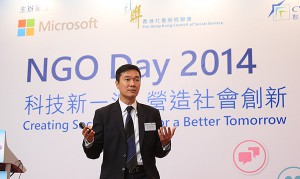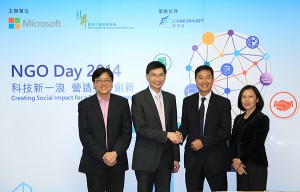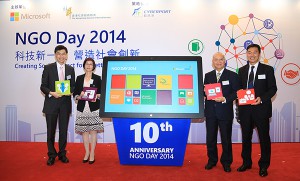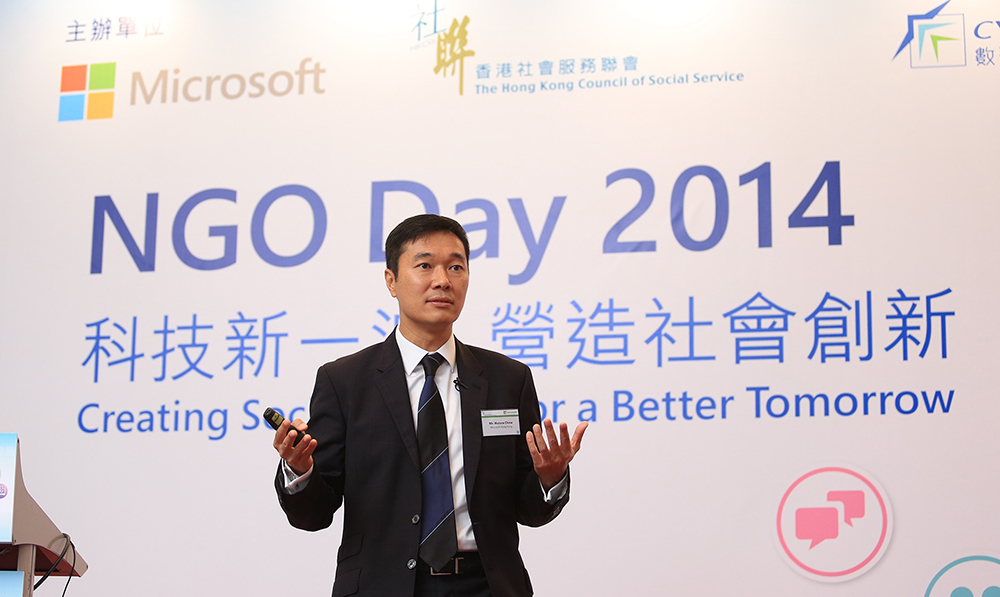Survey unveiled insights into NGOs’ practices in data manipulation and information technology security measures

Hong Kong, June 6, 2014 – Microsoft Hong Kong today celebrated the 10th anniversary of the NGO Day together with The Hong Kong Council of Social Service (HKCSS) with a full day of discussions and exchanges which showcased the illustrious history of both parties’ efforts in serving the community, as well as the significant and positive impacts it has made on non-profit organizations (NGOs) in Hong Kong over the past decade.
NGO Day event have been hosted for ten years as a showcase of both parties’ commitment to building an inclusive community through technology and partner collaboration, as well as promoting awareness on new technologies and opportunities for NGOs in Hong Kong. The successful decade of NGO Days has recorded more than 1,700 participants from NGOs, Government, IT associations and academic institutions. NGO Day is under Microsoft’s flagship community drive SparkHK to empower Hong Kong’s growth and competitiveness through innovation. In the past ten years, some of the major achievements in supporting NGOs include a total of HK$180M investment through different community initiatives, software donations at HK$109M for 434 NGOs through the TechDonation Program, HK$9.5M investment into YouthSpark training, and benefitting 500,000 people through Community Technology Learning Centers (CTLCs) run by NGOs.

“We highly value the long-term partnership with HKCSS. With their support, Microsoft Hong Kong has addressed the evolving needs of local NGOs over the past decade with significant results and positive impacts. Based on our team effort and continuous learning, we will continue to refine our existing programs and launch new initiatives in support of NGOs, and to redefine how Microsoft can better empower Hong Kong’s growth and competitiveness from a holistic perspective,” said Horace Chow, General Manager of Microsoft Hong Kong. “Today’s technology trends create almost limitless opportunities, and modern innovations are providing new possibilities for NGOs to reimagine their operations. With the emerging trends of cloud and Big Data, we believe that Microsoft as a leader can benefit NGOs in significant ways, so that they can enjoy improved efficiency and greater productivity through the unprecedented flexibility of cloud and gain valuable insights for delivering better services.”
The NGO Day this year also unveiled the latest NGO survey findings on data manipulation and security measures. The survey was jointly commissioned by Microsoft Hong Kong and HKCSS in May 2014, and was commented by Professor Wong Yu-cheung, Department of Social Work, The Chinese University of Hong Kong. With the wide adoption of Big Data in organizations worldwide, the findings indicated that NGOs mainly stored their data on internal servers and lack of relevant supporting software for utilizing Big Data. In this emerging trend of cloud and Big Data, NGOs are in need of effectively realizing the power of technology to further improve their overall operations as well as service quality. Key survey findings include:
A. Current IT situation of NGOs
- Most of the surveyed NGOs agreed that IT could help them with office operations (53%) and external information dissemination (49%).
- “Information security and privacy” is the prime concern of NGOs, ranking first (76%) in the list of their IT concerns, followed by “Shortage of the IT staff” (75%) and “Outdated hardware/ software” (60%).
B. Big Data manipulation
- Almost all NGOs (95%) expressed that electronic data is easy to search and retrieve. Most of the survey participants also noted data as useful for analyses (74%).
- 70% of surveyed NGOs indicated that they lack resources to store data electronically, with 53% of them expressed that they have encountered technical difficulties in digitizing data.
- 90% of surveyed NGOs also said the lack of relevant supporting software as one of the five biggest obstacles in utilizing Big Data.
C. Information security measures
- Most of the surveyed NGOs were equipped with basic data storage systems, with 90% of them storing their data on internal servers. Other common ways to store data include: personal computers (60%), data centers (30%) rented by NGOs and through external cloud services (26%).
- 72% of the surveyed NGOs said they mostly comply with measures aimed at managing permission and access to records; and 7% stated that they fully comply with such measures.
- Only 6% of surveyed NGOs fully comply with measures to secure data and prevent data leakage, with less than half (41%) having said they only mostly comply with these established measures.
D. Latest technology trends
- 35% of surveyed NGOs had no idea what Big Data is, while 47% revealed their understanding to Big Data as “big files with large quantity of data”.
- Most of the NGOs were aware of Department of Health and Hospital Authority’s e-Health Record with only 24% indicated that they have not heard of this scheme, and 28% of the surveyed NGOs said they fully understand the Government’s Data.One App.

“The survey revealed inspiring findings as to how NGOs deal with data management and data analytics. Many of the NGOs lack the technical know-how and the technology tools to collect and manage their data on their computers. Without effective data analyses, valuable data acquired in NGOs’ daily operations and service provision cannot prove its usefulness. With the concerted efforts of the Government, IT sector and community, we believe sensible use of these data and Government open data, with the help of adequate tools, could bring new insights into social issues and foster innovative ideas to tackle social problems,” said Chua Hoi Wai, Chief Executive of The Hong Kong Council of Social Service, “HKCSS also appreciates Microsoft’s initiatives and timely support in bringing next-generation innovations to the NGOs in Hong Kong. Only with such partnerships and long-sighted Government policy can NGOs keep enhancing their services to the community without compromising their agility, effectiveness, security and privacy.”
“We appreciate the tremendous support from Microsoft in the past decade, which exceeds HK$16 million including cash and free software. These resources enable us to run Community Technology Learning Centers at 18 HKFYG district locations between 2003-2007 and also provide YouthSpark training in our M21 center in 2013-2015,” said Ken Ngai, Head of IT, Hong Kong Federation of Youth Groups. “Apart from empowering youth with our training, we have also benefitted from using Office 365 for our internal operation, which helps us to save operational costs and also reduce manpower for more strategic organizational development. With a membership of more than 320,000, we see the increasing need of an integrated platform for storing, managing and analyzing data. We believe NGOs like us can reimagine our operations by leveraging the power of the new technologies such as cloud and Big Data.”
###
About Microsoft
Founded in 1975, Microsoft (Nasdaq “MSFT”) is the worldwide leader in software, services and solutions that help people and businesses realize their full potential. Microsoft Hong Kong was established in 1991.
About The Hong Kong Council of Social Service
The Hong Kong Council of Social Service (HKCSS) was established in 1947, representing, with clear vision and professional expertise, non-governmental welfare agencies committed to sustain and develop social welfare in Hong Kong. HKCSS has grown since then to become an umbrella organization of over 420 Agency Members, that provide over 90% of the social welfare services for those in need through their 3,000 service units all over Hong Kong.




